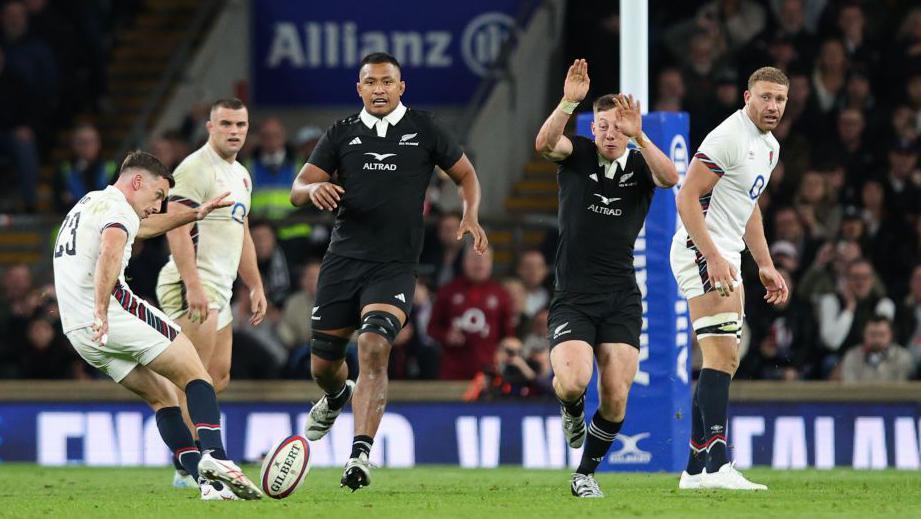Ford focus can't obscure England's other shortcomings

George Ford's drop-goal drifted just wide of the posts
- Published
It made sense at the time. In the grey matter and guts alike, the rationale felt right.
With 62 minutes on the clock, and an eight-point advantage on the scoreboard, you tighten the grip, not chance your arm.
Steve Borthwick chose that point to withdraw fly-half Marcus Smith - architect of his team's only try.
On came George Ford, a 97-cap arch game manager, the hero of England's World Cup win over Argentina, to snuff the life out of New Zealand and nurse the scoreline through to victory.
But, that's the thing: it always feels right at the time.
By the time referee Angus Gardner blew the final whistle, that reasoning, for many, had been exploded.
England had ceded momentum, territory and finally the lead, with New Zealand scoring 10 unanswered points in the final quarter and Ford missing two kicks - one penalty, one drop-goal - that would have snatched back victory.
Ford hasn't played for more than a month because of a quad injury. He wasn't ready. Smith was having a fine game. He should have been pulling the strings, not cooling his heels on the bench, when the final stages played out.
Now, that is the theory that fits. The events seem to bear it out. The narrative of where England lost the game is an easy tale to spin.
But Borthwick and his team will know there were more moving parts to England's latest defeat than just an exchange of 10s.
Recency bias - the phenomenon that loads greatest importance on the freshest events - doesn't last long in the video review.
When the tape rolls at Pennyhill Park this week, England's new defence coach Joe El-Abd will highlight the holes too easily opened by two blind-side darts that led to All Black tries.
The six replacement forwards – an Anglo-Saxon answer to South Africa's bomb squad – failed to detonate, falling foul of Gardner at scrums and breakdown.
An overall lack of an attacking threat, beyond Smith's smart intercept, meant England could never get out of the range of a late All Black surge.
Smith himself had two fluffed drop-goal attempts, both uglier shanks than Ford's effort.
Ford, who was also shrugged off by Mark Tele'a on the way to a match-winning try, undoubtedly had a day to forget.
But England's latest heartbreak – after a string of narrow defeats – has more sources than one man.
There will be positives to flag in the debrief. Smith was superb overall. Immanuel Feyi-Waboso was sharp. A back five of Chandler Cunningham-South, Ben Earl, Tom Curry, George Martin and Maro Itoje took the fight right to New Zealand.
England have not left themselves any wriggle room though. Before the match, they made clear that victory was everything. And they left with nothing.
Borthwick admitted that that stark fact was, ultimately, inescapable.
"It's important to understand also how much went right," Borthwick said.
"I think we played smart rugby. I think everyone would see that this team is developing into being a very strong team.
"I was proud of the effort and endeavour, but we have to learn to start getting on the right side of those close results.”
"I don't know how many we can lose in the dying embers," added Earl.
This was England's fifth loss in nine Tests in 2024, after defeats by France and Scotland during the Six Nations and a 2-0 series reverse in New Zealand. All but one of that quintet has been by a converted score or less.
Those are the margins, but that is also the trend.
Australia are next. England will be favourites against the France 2023-flunking Wallabies, even if former Ireland boss Joe Schmidt, in charge of their transition, will relish upsetting the odds.
Looming largest on the fixture list though are South Africa, who won a whole Rugby World Cup on the back of a deep squad, belief that ran down to the bootlaces and hairline solitary-point wins.
The Springboks arrive at Allianz Stadium on 16 November.
A suspect substitution is not the only problem to fix if England are to prevent their autumn wilting early.